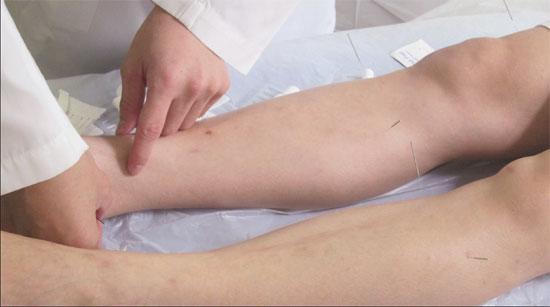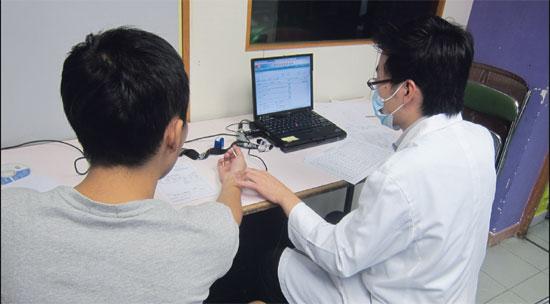Due to the hidden nature of the cyber world, Ho admitted that none of the drug users would voluntarily reveal his secrets to social workers but the workers could approach them when they asked drug-related questions on the Internet. "Start off with other issues, the young people may gradually tell us they also have drug problems, when we have built trust with each other."
The new platform lowers the guard of the vacillating students, who may turn to drugs when troubled, Ho pointed out.
 |
|
Acupuncture treatment has been proven effective to cure frequent urination of ketamine users. (Provided to China Daily) |
Ho complained, the government has spent a large sum of money "to sweep the dirt under the carpet". Drug dealing has gone underground but not disappeared, he said. "Schools are trying to get rid of drug-taking students, not helping them."
The government has long followed "a five-pronged strategy" to tackle the problem, focusing on "prevention education and publicity".
"It is by instilling a drug-resistant attitude among the public that we could avoid more people falling prey to the adverse impacts of drugs," said a spokesman of the Narcotics Division (ND), Security Bureau.
"On the preventive education and publicity front, the focus is on reducing the demand for illicit drugs by imparting knowledge on drugs to different stakeholders, dispelling any misconceptions, strengthening young people's life skills and resistance to adversity and temptations, and mobilising the whole community to join the anti-drug cause.
"With deterioration in the situation in youth drug abuse in the past decade, it becomes necessary and important to focus on preventive education work at schools, as an important platform through which to target young people, helping them to understand the evils of drugs and build a drug-resistant attitude," the spokesman added.
The government regarded the pilot Tai Po drug test scheme a successful one as no positive case had been found. Since then, the Healthy School Programme with a Drug Testing Component has been implemented in schools on a voluntary basis.
On June 5, the administration "briefed the Security Panel of the Legislative Council on the plan for launching a public consultation on whether community-based drug testing should be implemented, and if so, how."
"The government adopts an open attitude on the subject and has no preconceived idea, especially in the absence of a community consensus," said the ND spokesman.
The administration wants to stretch farther to cover drug addicts in the community, not just in schools. But Lau Wang-cheung worries that the move will drive more young people away from the streets.
"It is understandable that the schools try to get rid of drug addicts in the campus to protect the 'clean' students," said Lau. "But I would urge the authority not to just focus on drug tests."
Lau advocated an inter-departmental cooperation to address drug problems among young people, because "eradicating the supply chain won't be adequate to combat the widespread drug abuse," because the government does not delve into reasons why the young people choose to take drugs in the first place.
"Some kids just don't do well academically and they have low self-esteem. They lose identities in mainstream society. By retreating to drugs, they feel like they are alive," Lau said. "Somehow they feel that drugs mean something to them."
In order to help them kick the addiction, Lau suggested, it is important to let them find a goal, small or big, in life to substitute their loneliness when they quit taking drugs.
 |
| ELCHK offers rehab services for long-term drug users, 80 percent of them use ketamine, to ease their pain for quitting, by Chinese medicine and acupuncture treatment. (Provided to China Daily) |
After releasing a big sigh, Lau went on saying, "There are, and will be, a certain number of young people living under the poverty line and lack of opportunities to move upward, so we have to lend them a hand in their most difficult times."
In addition, Stanley Ho said, giving the youths "a second chance" to become self sufficient is vital to encourage them to abandon drugs for good.
"Many of them want to leave the circle, but due to hardships, since they can hardly go back to school and get stable jobs, they prefer to risk danger to make more money," Ho said, adding that being a small drug dealer can earn HK$100,000 a month.
"It's not just about kicking the habit, but a matter of prospects for these young people."
The government is willing to offer a hand to the needy kids, the ND spokesman said. "We encourage rehabilitated youths (such as those who have completed the voluntary treatment programmes) to return to schools. The Regional Education Offices and Non-attendance Cases Team of Education Bureau provide placement services to ensure that rehabilitated students aged 15 or below attend schools and to assist those above 15, if they so wish, in seeking suitable school places."
Sky's parents eventually found out about his covert habit several years ago. "They noticed my enervated appearance and my frequency of using the toilet."
Sky encountered similar response as other families who face similar situations: father lambasting, mother crying, and sister helping to look for social workers.
Sky then accepted acupuncture treatment provided by ELCHK. The centre offers rehab services for long-term drug users, 80 percent of the drug abusers use ketamine, not to help them kick the addiction, but to ease their pain for quitting and enhance their bodies, to prepare them for treatment through Chinese medicine and acupuncture.
"We have seen impressive results using acupuncture treatment to cure frequent urination," said Wong Ka-yee, a registered Chinese Medicine Practitioner at Pok Oi Hospital. The three-month, 31-session treatment helps normalize the patients' bladder function, she added. For instance, a five-minute frequency of washroom visits can be improved to five to six hours.
"Many of the patients know deep down they need to get rid of ketamine once and for all, but they can't endure the pain of going to toilet, so they continue to take it which creates a vicious circle," Wong remarked.
Luckily, Sky works with his father at a car repair shop which enables him to support himself.
Sky still goes out with his childhood friends on sporadic occasions. When asked whether his friends still hook on drugs, he played coy, but vowed to stay clean in the future. "For myself, for my family and for my girlfriend, I won't do it again."
"I feel like I have wasted a lot of time..." Sky paused for a few seconds then continued, "I knew this was bad but didn't know why I had to do it. It was meaningless.
"Never ever take the first snort," Sky warms the youths of today, with a sincere, bashful smile.
